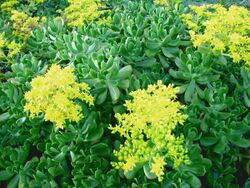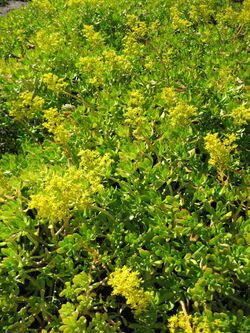Biology:Sedum praealtum
| Sedum praealtum | |
|---|---|

| |
| Scientific classification | |
| Kingdom: | Plantae |
| Clade: | Tracheophytes |
| Clade: | Angiosperms |
| Clade: | Eudicots |
| Order: | Saxifragales |
| Family: | Crassulaceae |
| Genus: | Sedum |
| Species: | S. praealtum
|
| Binomial name | |
| Sedum praealtum | |
Sedum praealtum, also known as shrubby stonecrop or green cockscomb is a small, woody succulent shrub in the stonecrop family that is native to Mexico.[1]
Description
It features sub-woody brown or grayish stems and fleshy, hairless leaves. It grows to 3 feet tall (90cm) and spreads to 4 feet (1.2m). The lime-green leaves are spatulated and are 1.5 inches (3.8cm) long, arranged in rosettes. Large clusters of bright, star-like yellow flowers appear from late winter to spring. The plant tends to be summer-dormant.[2]
It is closely related to Sedum dendroideum and would look similar to it, but 'dendroideum' can be differentiated by the existence of a line of subepidermal glands on its margins near the leaf tips.[3]
Cultivation
It can be used as a bonsai due to its treelike appearance and it bears a resemblance to the Jade plant.[4] It easily grows in rock gardens in well-drained, poor soils. Propagation can easily be done by cuttings and the plant is not cold hardy.[5]
Uses
A spermicide developed from this plant, that helps women control birth rates without any major side effects, was around 20% more effective than nonoxynol-9. Its leaf substance has been traditionally used for burns, hemorrhoids and dysentery, gum inflammation, and as well as an eye drop for conjunctivitis and irritations.[6]
References
- ↑ Sedum praealtum (Green Cockscomb) by World of Succulents
- ↑ Sedum praealtum - Shrubby Stonecrop Succulents and Sunshine LLC
- ↑ Sedum praealtum - Bush Sedum San Marcos Growers
- ↑ Sedum Praealtum (Green Cockscomb) succies.com.au
- ↑ Sedum praealtum (Green Cockscomb) – Succulent plants Planting Man
- ↑ Sedum Praealtum “Shrubby Stonecrop” The Tilth
Wikidata ☰ Q15486137 entry
 |


